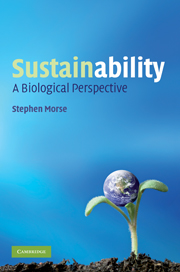Book contents
- Frontmatter
- Contents
- Preface
- 1 Sustainability: a word of our time
- 2 Sustainable agriculture: more and more production
- 3 Sustainable management of fisheries
- 4 Applying sustainability to industry
- 5 Social and economic dimensions to sustainability
- 6 The ‘doing’ of sustainability
- 7 Sustainability science?
- References
- Index
1 - Sustainability: a word of our time
Published online by Cambridge University Press: 05 June 2012
- Frontmatter
- Contents
- Preface
- 1 Sustainability: a word of our time
- 2 Sustainable agriculture: more and more production
- 3 Sustainable management of fisheries
- 4 Applying sustainability to industry
- 5 Social and economic dimensions to sustainability
- 6 The ‘doing’ of sustainability
- 7 Sustainability science?
- References
- Index
Summary
INTRODUCTION
Sustainability, often employed as a short-hand term for sustainable development, is truly a word of our time. In the early twenty-first century we inhabit a world which is witnessing a dramatic change in climate, the rise of new economic powers, a crisis in the global financial system and technological breakthroughs that happen almost on a daily basis. All of this can only enhance what we all intuitively know – that the planet is in a state of flux when assessed in environmental, economic or social terms. What we see around us today may not be what we see in the future – the world will be different. But what will that world be like, or perhaps more to the point, what do we wish it to be like? Do we want our children and our children's children to be able to enjoy the environment we have today or do we want them to have better than that? These are important questions, but in the busy lives we lead trying to do better for our families in this generation, it can be tough thinking that far ahead.
Sustainability is all about people and time; the past, present and the future. The past because it teaches us a great deal about human existence and how we have responded to stresses, the present because we have a moral duty to make sure that those alive today have the best quality of life that can be provided and the future because what has been done in our past and present should not damage the ability of future generations to enjoy a good quality of life.
- Type
- Chapter
- Information
- SustainabilityA Biological Perspective, pp. 1 - 18Publisher: Cambridge University PressPrint publication year: 2010



